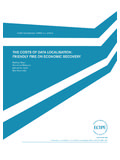Transcription of DEMYSTIFYING INVESTOR-STATE DISPUTE …
1 ECIPE OCCASIONAL PAPER No. 5/2014. DEMYSTIFYING INVESTOR-STATE . DISPUTE SETTLEMENT (ISDS). By Roderick Abbott, Fredrik Erixon, and Martina Francesca Ferracane, ECIPE. Rue Belliard 4-6, 1040 Brussels, Belgium Phone +32 (0)2 289 1350. ECIPE OCCASIONAL PAPER. EXECUTIVE SUMMARY. - INVESTOR-STATE DISPUTE Settlement, a legal provision in bilateral investment treaties (BITs). or other International investment Agreements that gives investors a right to call for arbitra- tion with a state, has recently become the centre of controversy in a debate over the Transat- lantic Trade and investment Partnership (TTIP). Critics argue that such a provision is either illegitimate, unnecessary, and/or does not have any positive influence on flows of Foreign Direct investment (FDI).
2 More radical critics argue that ISDS is a provision that allows big companies to sue governments when they have made democratic choices with negative con- sequences for companies. - This study surveys the recent decade of ISDS activity. It concludes that the number of ISDS. cases has continued to grow, and that the growth is concentrated to certain sectors with a high degree of government involvement or political patronage. - Based on the ISDS data, it is clear that investors in the European Union are by far the most active users of ISDS. EU countries have many more BITs with ISDS than for instance the United states . EU investors represent more than half of the entire complaints filed at inter- national investment tribunals in the past decade.
3 - ISDS cases are often settled in advance of a ruling. It is a mechanism to facilitate an ordered settlement of a DISPUTE and represents a preference for settlements between the parties rath- er than tribunal rulings. Twice as many cases that end with a tribunal ruling are won by the state than the investor . The number of known ISDS cases in the past ten years that ended with a tribunal ruling in favour of the investor is no more than 16. - The typical ISDS case is between a developed-country investor and a developing-country government. There is a correlation between the number of disputes and a legal system's capacity to facilitate DISPUTE resolution, or the quality of the legal and regulatory regimes. There has been no ISDS case between the United states and an EU-15 country, but a handful of cases between a investor and the countries that joined the EU in the 2000s.
4 - Economic research gives support to the argument that investment -protection agreements help to promote FDI. The effect is unlikely to be strong because there are far more important determinants of FDI, such as investment market access. - The choice of the EU to favour a new collective BIT with the United states or not is likely to have systemic consequences. If EU member states withdraw from their existing BITs, which is the logical conclusion from a good part of the criticism, the consequences are likely to be far stronger. The competitiveness of EU investors in third countries, especially in sectors with high government involvement, is likely to be damaged. 2 No. 5/2014. ECIPE OCCASIONAL PAPER. 1. INTRODUCTION. INVESTOR-STATE DISPUTE Settlement (ISDS) is a legal instrument in bilateral investment treaties (BITs), or BIT-like bilateral and international agreements such as the Energy Char- ter Treaty, that grants investors the right to call for arbitration in the event they believe that a government has violated such an agreement.
5 In contrast to a mechanism to resolve disputes between states , like the World Trade Organisation's DISPUTE -settlement mechanism, it is not an instrument that puts on trial laws and regulations in a host country, with the con- sequence that a government has to change a law or a regulation in the event they lose a case. Nor do investment -protection agreements demand that a country fully transpose the general principles of such an agreement into national laws and regulations. However, in the past months BITs have become the centre of controversy in Europe in the debate over the current negotiations for the so-called Transatlantic Trade and investment Partnership (TTIP). It is not the first time that international investment agreements have provoked controversy.
6 In the late 1990s, there was a big discussion over a new Multilateral Agreement on investment (MAI), at the time negotiated in the OECD, and much of the criti- cism now follows the script of the critics back then. In the European Union, criticism has now come from both individual Member states and from deputies in the European Parlia- ment. Several Non-Governmental Organisations (NGOs) have also voiced criticism. It is somewhat difficult to give a distinct character of the criticism. One wing of the argument appears to entirely disapprove that states enter international agreements that constrain their flexibility to change policy in future. Another wing goes even further and claims that courts, including national courts, have no legitimate role in defending companies against democratic decisions by a government.
7 These views are not challenging because they undermine ISDS. they are challenging because they refute constitutional democracy, the principle that sub- jects of the state have rights, including legal recourse to defend against state actions, and be- cause they make it impossible for a government to enter an international binding agreement. There are differences also between the softer critics. While some appear to disapprove in principle of investment protection, which BITs and ISDS are all about, others appear to ar- gue that they may be necessary instruments in agreements with some countries, but not with others. The qualifying factor is the quality of the national legal system and the recourse that the legal system offers to settle disputes with host governments.
8 There is also a wing of the argument that favours ISDS with all countries but that wants to reform BITs and provisions around ISDS with the view of limiting the use of ISDS. Part of the debate now is also a reflection of a fraction between EU member states , and be- tween some member states and the European Commission, following the entry of the Lis- bon Treaty. These divisions have concerned what the Lisbon Treaty actually imposes- the transfer of Foreign Direct investment (FDI) competence from Member states to the EU - and what the new Common Commercial Policy1, including investment protection, implies for the legal standing of existing BITs that individual EU Member states have signed with other countries. While this debate has been fraught with technical and legal aspects, some of the big issues have related to the compatibility of existing BITs (signed by individual Member states ) and EU single market law, and the extent to which those existing BITs actually carry full legal force until they have been substituted by a common EU BIT.
9 1. The EU Common Commercial Policy is now also a matter of full competence in the EU, meaning that indivi- dual countries cannot engage in trade policy agreements with third countries. 3 No. 5/2014. ECIPE OCCASIONAL PAPER. That debate, depending on whom you ask, has been settled or paused. Yet the European Com- mission is now reviewing its approach to ISDS with the ambition of defining a new stance in the autumn of 2014. A document with proposals for how the EU should approach ISDS was released last During this period of review, the EU has taken a pause in its negotia- tions of investment protection in TTIP. The mandate for the TTIP negotiations, endorsed by Member states as well as the European Parliament, gives, however, a clear instruction to the Commission to negotiate a new accord on investment protection with the United states that substitutes the current BITs and BIT-like bilateral agreements that individual Member states have with the Furthermore, the European Parliament has passed a resolution on the urgency of replacing individual EU Member State BITs with a common EU This study examines the recent history of INVESTOR-STATE DISPUTE Settlements with the pur- pose of getting a better factual understanding of what cases have been brought to arbitration and what the outcomes of these cases have been.
10 It records the cases between 2003 and 2013, and presents aggregate as well as individual results. This is done in chapter 3. Furthermore, the study presents the results from academic research about the consequences of BITs. The paper ends with some concluding remarks. 2. THE RISE OF investment PROTECTION: MAPPING THE BIT LANDSCAPE. Trade disputes have existed for as long as people wanted to trade with each other be- tween different towns in the same region and between neighbouring countries and beyond. Mostly these could be imagined to be disputes about non-performance of a contract failure to deliver the right goods and at the right time. They were disputes person-to-person. investment disputes have a shorter history, since the time when some richer countries start- ed to invest overseas and companies built factories in other countries.



